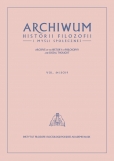Koncepcja harmoniki Arystoksenosa z Tarentu
The Concept of Aristoxenos’ Harmonic Science
Author(s): Anna Maria LaskowskaSubject(s): History of Philosophy, Philosophical Traditions
Published by: Instytut Filozofii i Socjologii Polskiej Akademii Nauk
Keywords: Arystoksenos; harmonika; harmonia; melos; dźwięk; słuch; pitagorejczycy
Summary/Abstract: Aristoxenus of Tarentum in his treatise Elementa harmonica created his own philosophical system in the field of sound research, which differed from the concept of harmonics proposed by the Pythagoreans. The fundamental difference concerned primarily the methodology of research. Aristoxenus considered the careful observation of acoustic phenomena as the starting point for all research, and thus as a fundamental criterion of truth. According to him, only perception could verify the state of things as being consistent with reality. The neglect of the hearing testimony, as was the case with Pythagoreans, was unacceptable to Aristoxenos, and he considered it to be a significant methodological error. The harmonikos had to be an attentive observer of acoustic phenomena, with additionally trained musical ear.
Journal: Archiwum Historii Filozofii i Myśli Społecznej
- Issue Year: 64/2019
- Issue No: 64
- Page Range: 45-56
- Page Count: 12
- Language: Polish

